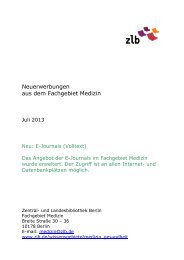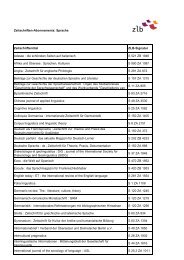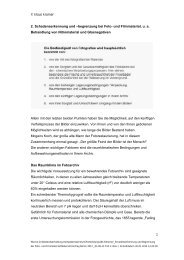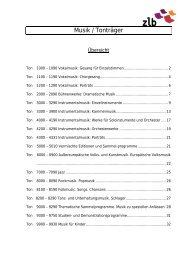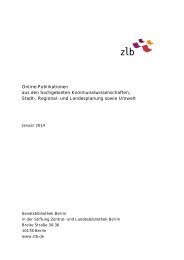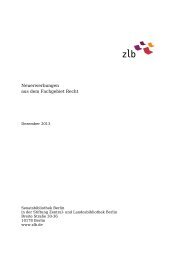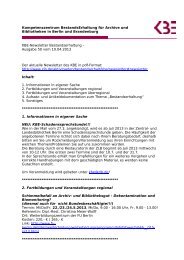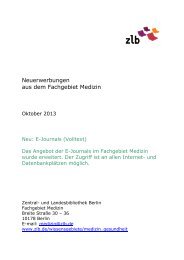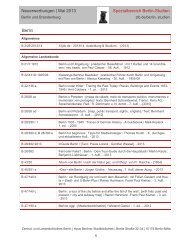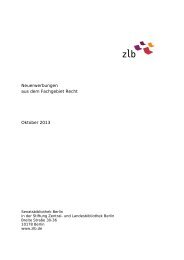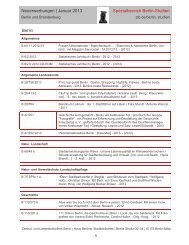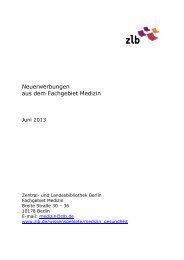12. Exkurs: Die Frankfurter Schule - Zentral- und Landesbibliothek ...
12. Exkurs: Die Frankfurter Schule - Zentral- und Landesbibliothek ...
12. Exkurs: Die Frankfurter Schule - Zentral- und Landesbibliothek ...
Sie wollen auch ein ePaper? Erhöhen Sie die Reichweite Ihrer Titel.
YUMPU macht aus Druck-PDFs automatisch weboptimierte ePaper, die Google liebt.
Husserl, Heidegger, Funke <strong>und</strong> die deutsche Philosophie im 20. Jahrh<strong>und</strong>ert<br />
Adorno can be very difficult to read. He writes in<br />
a manner which does not lend itself to ready comprehension.<br />
This is intentional. Adorno views language<br />
itself as having become an object of, and vehicle for,<br />
the perpetuation of domination. He is acutely aware<br />
of the extent to which this claim complicates his own<br />
work. In attempting to encourage a critical awareness<br />
of suffering and domination, Adorno is forced to use<br />
the very means by which these conditions are, to a<br />
certain extent, sustained. His answer to this problem,<br />
although not intended to be ultimately satisfying, is<br />
to write in a way that requires hard and concentrated<br />
efforts on the part of the reader, to write in a way that<br />
explicitly defies convention and the familiar. Adorno<br />
aims to encourage his readers to attempt to view the<br />
world and the concepts that represent the world in a<br />
way that defies identity thinking. He aims, through<br />
his writing, to express precisely the unacknowledged,<br />
non-identical aspects of any given phenomenon. He<br />
aims to show, in a manner very similar to contemporary deconstructionists, the<br />
extent to which our linguistic conventions simultaneously both represent and misrepresent<br />
reality. In contrast to many deconstructionists, however, Adorno does<br />
so in the name of an explicit moral aim and not as a mere literary method. For<br />
Adorno, reality is gro<strong>und</strong>ed in suffering and the domination of nature. This is a<br />
profo<strong>und</strong>ly important distinction. Adornoís complaint against identity-thinking is<br />
a moral and not a methodological one. However, it must be admitted that <strong>und</strong>erstanding<br />
and evaluating the strengths and weaknesses of Adornoís philosophical<br />
vision is a difficult task. He does not wish to be easily <strong>und</strong>erstood in a world in<br />
which easy <strong>und</strong>erstanding, so he claims, is dependent upon identity-thinkingís falsification<br />
of the world.<br />
Adornoís writing style follows, in large part, from his account of reason. Adornoís<br />
<strong>und</strong>erstanding of reason has been subject to consistent criticism. One of the<br />
most significant forms of criticism is associated with Jurgen Habermas, arguably<br />
the leading contemporary exponent of critical theory. In essence, Habermas (1987)<br />
argues that Adorno overestimates the extent to which reason has been instrumentalized<br />
within modern, complex societies. For Habermas, instrumental reasoning<br />
is only one of a number of forms of reasoning identifiable within such societies. Instrumental<br />
reasoning, therefore, is nowhere near as extensive and all-encompassing<br />
as Adorno and Horkheimer presented it as being in the Dialectic of Enlightenment.<br />
For Habermas, the <strong>und</strong>ue importance attributed to instrumental reasoning<br />
has profo<strong>und</strong> moral and philosophical consequences for Adornoís general vision.<br />
Habermas insists that Adornoís <strong>und</strong>erstanding of reason amounts to a renunciation<br />
of the moral aims of the Enlightenment, from which critical theory itself appears<br />
to take its bearings. There is not doubt that the deployment of technology<br />
has had the most horrendous and catastrophic effects upon humanity. However,<br />
Habermas argues that these effects are less the consequence of the extension of<br />
reason gro<strong>und</strong>ed in the domination of nature, as Adorno argues, and more an aberration<br />
of enlightenment reason. Adorno is accused of defending an account of instrumental<br />
reasoning that is so encompassing and extensive as to exclude the possibility<br />
of rationally overcoming these conditions and thereby realizing the aims of<br />
critical theory. Adorno is accused of leading critical theory down a moral cul-de-<br />
310



